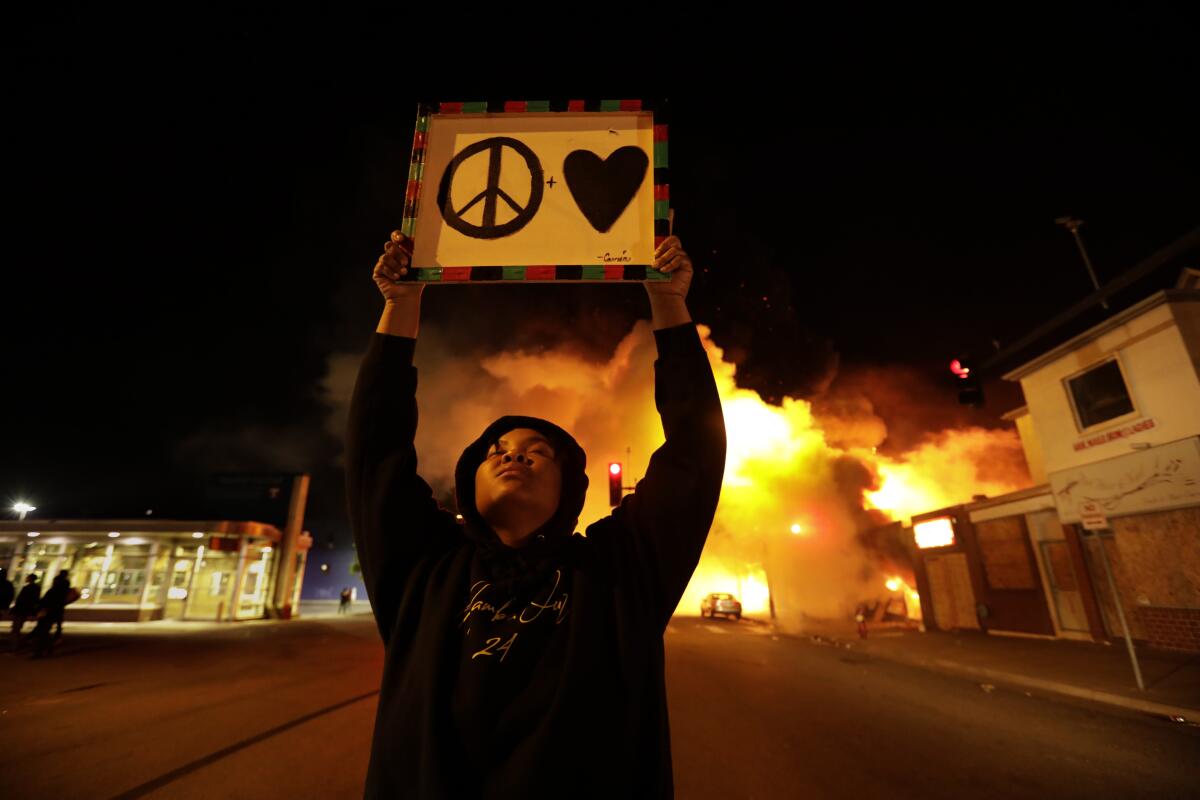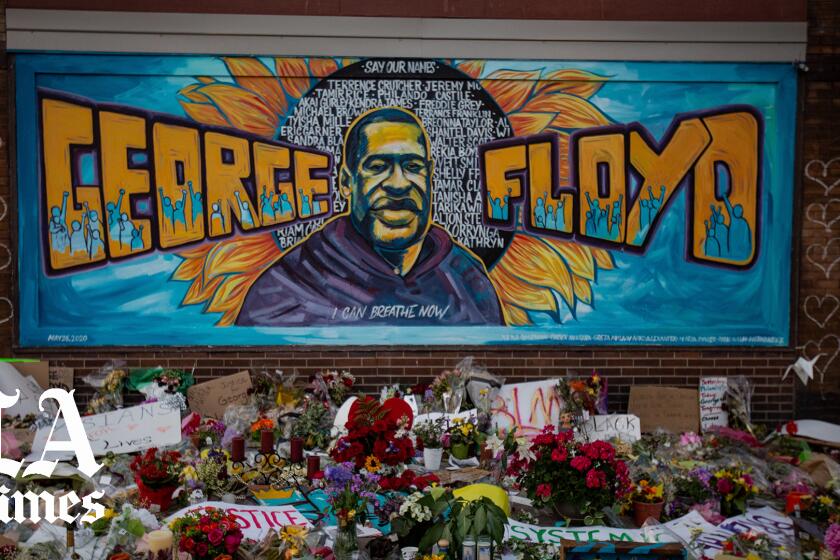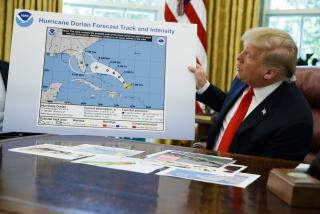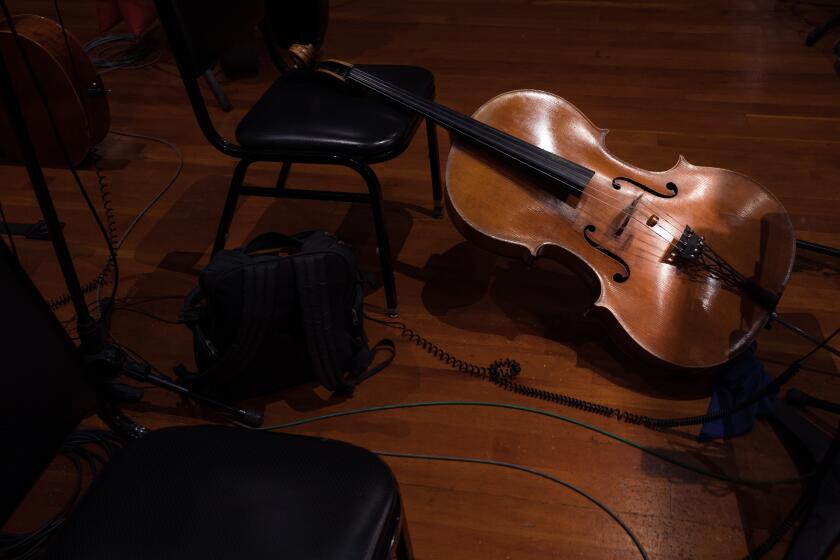Op-Ed: What will it take to stand up again together? Start with accountablity

Our nation is not healthy enough to handle this much pain. A cascade of crises has brought us to our knees and to the streets: a pandemic that locked us down and ravaged the population, especially communities of color; an economic convulsion that flattened small businesses and hurled 40 million people out of work; and the three horrific killings of unarmed black Americans during this spring of despair.
What will it take to end the pain, to stand up again together? Let’s start with accountability — an end to the impunity that defines our age.
The difference in the arrests of Floyd and the four police officers involved in his killing shows why anger is filling America’s streets.
The 21st century has been generous beyond belief to those who came to the table already set up for success. I count myself among them. We can shelter in place, take a hit to our routines and even our savings, and expect to recover. The pandemic has exposed how willing we as a nation are to send disproportionately black and brown “essential” workers out to do their jobs whether or not it is safe. It has exposed the breathtaking speed with which our leaders will write trillion-dollar checks to protect corporate interests and shield financial markets. And it revealed the willingness of rich and comfortable companies to take as much as they can get.
All four living former presidents came forward in recent days, emerging from their customary disciplined reserve to call us to account, to harder work and higher values.
“The only way for us to see ourselves in a true light is to listen to the voices of so many who are hurting and grieving,” wrote George W. Bush.
“It falls on all of us to work together to create a ‘new normal’ in which the legacy of bigotry … no longer infects our institutions or our hearts,” wrote Barack Obama.
I’ve written about presidents and the presidency for 25 years, and I see in the statements from all the living presidents, and Bush and Obama especially, a reminder of what used to be a minimal requirement for American leadership: However much they may differ in ideology or partisan interest, presidents must share a determination to unite and inspire as a means of achieving their goals, our goals. That wasn’t genius; it was table stakes.
President Trump plays an altogether different game. He divides and destroys; he poisons our discourse, betrays our allies, emboldens our adversaries and inserts hot knives into the raw wounds of our body politic. He has dismantled the machinery of accountability, assailing a free press, firing inspectors general, enslaving his party in Congress, and bending the Justice Department to his will. He brandishes the mighty American military as though its mission is to subdue rather than protect us.
We have seen his brand of impunity adopted too often on our streets in the days since George Floyd was killed. Police officers in riot gear, knowing their conduct was in the spotlight, nonetheless have kicked, bashed, shot at peaceful protesters and even bystanders on their suburban porches. With cameras trained on them, peace officers drove their vans into a crowd, pulled off a protester’s mask before pepper-spraying him, turned rubber bullets on news crews.
The police have been met, in too many instances, by counterparts whose arrogance matches their own. We’ve seen hundreds of thousands demonstrating peaceably, and but also those willing to vandalize the meaning of the protests, to behave in a way that assumes there will be no reckoning, no price to pay for looting a store or igniting a car or driving a truck into a protest line.
Watching from the safety of home or experiencing it in the streets, it has been at times a pageant of our pathology — no remorse, no pity, only the power of brick and the torch, the baton and pepper spray.
“I imagine one of the reasons people cling to their hates so stubbornly,” James Baldwin observed, “is because they sense, once hate is gone, they will be forced to deal with pain.”
It is time to deal with pain, the pain we cause and the pain we fail to prevent or relieve. A doctor will tell you that bruises look worse before they get better, a fever rises before it can break and bring relief. America is bruised and fevered, and it is way past time to stop pretending everything is fine.
The crisis of accountability devolves onto each of us, to hold ourselves accountable and those we put in power, hold accountable those who use our pain to sow chaos, hold accountable the businesses we patronize and the causes we champion. The protests remind us that pain is a tool of survival, a signal to do something, pull your hand back from the fire, bind the wound.
People have risked their health and safety to grieve together for what we have become and all that we have lost. This time, by God’s awful grace, healing may come in the mourning.
Nancy Gibbs, the former editor of Time magazine, is the director of the Shorenstein Center on Media, Politics and Public Policy at Harvard. She is co-author of two presidential histories.
More to Read
A cure for the common opinion
Get thought-provoking perspectives with our weekly newsletter.
You may occasionally receive promotional content from the Los Angeles Times.











